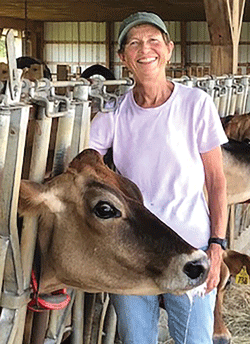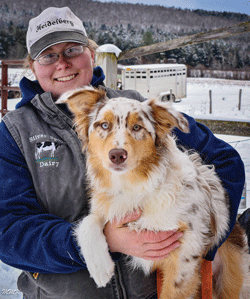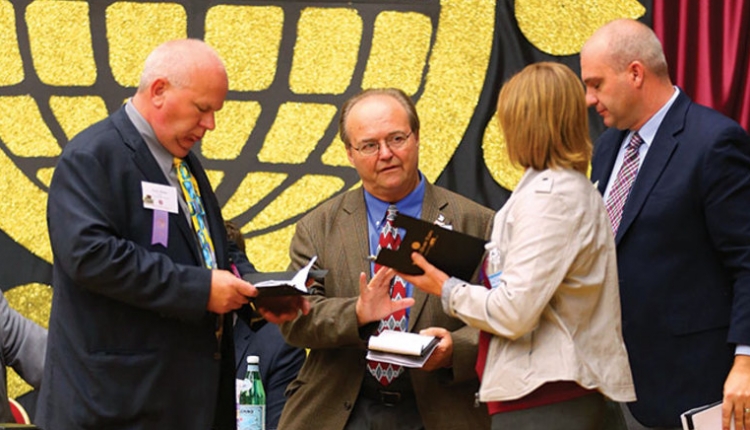
Women have always been integral to the operation of a dairy farm, through work on the farm itself and decisions made at the kitchen table. USDA’s latest Agricultural Resource Management Survey reports women — wives, mothers, daughters, sisters, and partners — are “secondary” operators on 54% of the dairies in this country. Women who are “principal” operators lag far behind at just 4%.
These demographics, though, are sure to change in the coming years. A decade ago, in 2012, of the five U.S. institutions that graduated the most students in agriculture, Texas A&M was the only university to graduate women and men in equal proportions. Eight years later, women graduated in nearly equal numbers at the top five schools and even represented 72% of agriculture degrees awarded by the University of California-Davis.
Two women who operate a dairy farm as principal or secondary operators share their stories here. Both concur that no man — or woman — is truly an island when it comes to running a dairy. It takes a team. Both agree, too, that at the end of the day, there is no better way to make a living than milking cows.
Judy Gifford has operated St. Brigid’s Farm, a registered Jersey farm two miles east of the Chesapeake Bay, with her husband, Dr. Robert “Bob” Fry, since December 1996. Dairy farming is a second vocation for Judy, who had a distinguished 18-year career in education and government.
She met Bob while working a second job at Windy Knoll Farm, where he did work as a veterinarian. When the owners were ready to sell, Bob and Judy purchased the farm with his parents as co-signors and renamed the place St. Brigid’s Farm. “So, at the age of 40, I got my dream job,” remarked Judy, who farms near Kennedyville, Md.
Because his veterinary practice takes him off the farm frequently, one will find Judy managing, moving, feeding, and mating cows, plus maintaining pasture fences and facilities on her own. Bob is the herd vet, inseminator, and calf and heifer feeder. He also scales the silo and fertilizes and irrigates fields. The couple gets about eight hours of weekend help from Jonas King, a young Amish man who has assisted them for the past seven years.
The picturesque farm is set up to enable Judy to focus on cows rather than crops and equipment. Cattle are rotationally grazed on a permanent, 48-acre stand of clovers, fescue, rye, and orchardgrass from April through November. This year, for the first time, 12 acres of no-till corn were planted to enable the couple to grow more of their own forages. Crops are custom planted and harvested, and manure and cattle hauling are often hired out.
In 2018, when a shoulder injury made it difficult for Judy to milk in the flat barn parlor, a Lely robot was installed. The robot has enabled Judy to push official “retirement” down the road.
This spring, to capitalize on cattle prices and improve soil health, 50 head were sold. The herd is now “right sized” at 38 cows. Jersey steers are also raised on the farm and marketed locally as grass-fed beef.
The slight-framed Judy raises Jerseys as they are smaller than other breeds. She acclimates newborn calves to humans so they remain “friendly” as they grow, and she uses low-stress handling concepts to coax and induce movement rather than manhandling.
“I never chase a cow. I use a fencing reel and a lightweight, 5-foot aluminum panel to move cows by limiting their options. These are wonderful for extending my reach and moving cows into a robot, headlock, or hoof trimming chute,” said the co-owner of St. Brigid’s Farm.
Anyone who knows Judy knows she is a problem solver and a planner; she is analytical, picky, and organized. These characteristics made her effective in her first career as well as her second.
“I spent my childhood around cattle, so I am good at observing for illness, heat, or peculiar behavior. Outside of that, I was never trained in anything I do here, so I have mostly learned by doing. I like to solve problems by finding patterns and thinking ahead,” added Judy.
Moved to co-ownership
After she graduated from Virginia Tech in 2008 and gained two years of experience at Conant Acres in Canton, Maine, Sonja Galley returned home to dairy with her parents, Dave and Cathy. In 2014, the trio established a limited liability corporation with clear intent for this to be Sonja’s business baby.
The Galleys operate the 60-cow registered Holstein dairy with the help of two students for afternoon chores, a nutritionist, and a small team of veterinarians. Sonja is responsible for overall herd management, the majority of milkings, health care and treatments, matings, and breedings.

Dave feeds cows and heifers in the mornings, and Cathy feeds calves. Sonja’s dad and mom also do the bulk of the planting and harvesting for now. Sonja is taking on additional farming responsibilities, though, and plans to also use custom croppers as her parents head into retirement.
“This summer, I tedded hay for the first time and am now pretty good with the skid steer and packing the bunk with the tractor,” noted Sonja, who farms near Garrattsville, N.Y. “That may seem silly to some, but I grew up with three gearhead brothers whose hands went up first when it came to tractor work and farming,” she said with a smile. “I had always been okay with this because it allowed me to be in the barns and learn about the cows.”
Sonja also gets a hand with her chores from a pack of award-winning Australian Shepherds. The Aussies help her drive cattle in the freestall barn, guide them to and from pastures, and isolate them for treatments. They also help her move haltered cattle across the farm.
“Though the dogs are important for me, they are not for everyone. They are a lot of work and their training is a trade-off of effort. But for me, working the cows with canines is a neat way to marry two of my passions,” said the co-owner of Silver Spoon Dairy.
Sonja competes in canine agility, trains obedience behavior, and breeds a litter every year or two. Her pack includes five Aussies that range in age from 10 months to 11 years. Her workers are 4-year-old Reese and 7-year-old Bindi; Bindi was named 2021 Farm Dog of the Year by the American Farm Bureau Federation.
Living in rural America, Sonja is keenly aware of the value in cultivating mental health. She relies on a core group of friends and a networking team developed over the years to provide sage advice, solutions to problems, and a listening ear.
After she was diagnosed with Lyme disease earlier this year, Sonja also learned the importance of rest and restoration for long-term health.
“For us farmers, this is not an easy task, especially when there are crops to grow and cows to tend. But when those tasks are done, I make sure I give myself a break. For having done it, I will be in a better place to make decisions for the farm and do my job.”
Moving beyond bias
Though women are assuming roles once held primarily by men, the stigma of a man’s world lingers. Women are not always included on deeds and titles. Many assume a woman will feed calves but not chop corn or haul manure. However, in some cases, the bias is hardly noticeable.
“I run into more dismissiveness than discrimination,” noted Judy. “They may be two sides of the same coin, but dismissiveness is more pervasive and subtle. Sometimes I will say something in a meeting or work situation that goes unheard and then someone else will repeat my suggestion and get loads of credit. I must be persistent, as Senator Elizabeth Warren says.”
As women blaze new trails, they may need to be their own cheerleaders to overcome self-imposed bias, noted Judy. “Bigger than dismissiveness may be what goes on in my own head. I often remind myself that my work carries as much weight as Bob’s or any other farmer’s.”
Whether in the barn or the suburbs, women everywhere struggle with work-life balance, which almost always includes traditional female roles at home. This is a special challenge for women dairy farmers, whose days are long and offices are located in the backyard.
“I had a housekeeper for years but didn’t replace her when she retired,” Judy continued. “I got a robotic vacuum instead, which isn’t as good but is better than nothing.”
As society evolves, stereotypes may disappear altogether, especially when women are raised in supportive environments from the onset. “I think I have had it pretty easy,” commented Sonja. “Dad has always supported me jumping in with both feet and never uttered the word ‘cannot.’ Mom has been a terrific role model. She was among the first women to earn an Empire degree from New York FFA.”
As a dairy industry, let us create a culture like this, one in which every young woman who says “I want to be a dairy farmer” never gets a sideways glance.









